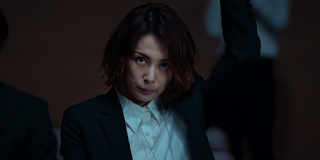City Hunter; or, Mokkori Mania
There’s a chance you will celebrate your next birthday in hell.
Inspired by the Netflix live-action adaptation of City Hunter that came out this year, I decided to finally check out the glorified anime series from the 1980s that ran for four seasons and was followed by theatrical OVAs. My motivation for picking up the anime consisted mainly of action-packed vibes of the previously discussed movie, but also of the opinions of my dear MDL friend, SumiTheCat.
There’s a chance you will celebrate your next birthday in hell.
Inspired by the Netflix live-action adaptation of City Hunter that came out this year, I decided to finally check out the glorified anime series from the 1980s that ran for four seasons and was followed by theatrical OVAs. My motivation for picking up the anime consisted mainly of action-packed vibes of the previously discussed movie, but also of the opinions of my dear MDL friend, SumiTheCat.
Release Info
Developed by: Toshio Nakatani, Masuo Ueda Voice actors: Akira Kamiya, Kazue Ikura
Language: Japanese Original Title: シティーハンター No of eps.: 51 (season 1)
Synopsis
Ryo Saeba is a sweeper for hire. He basically rushes to action as a detective, bodyguard, or enforcer for hire whenever the police are helpless. Oftentimes, he aids beautiful women simply because… he likes beautiful women. People in need get in contact with Saeba by leaving the XYZ mark on a blackboard at Shinjuku Station. Initially, Saeba operates the business with a friend and former cop Makimura, but when he gets killed by mobsters, his sister Kaori takes over as City Hunter’s partner.
Ryo Saeba is a sweeper for hire. He basically rushes to action as a detective, bodyguard, or enforcer for hire whenever the police are helpless. Oftentimes, he aids beautiful women simply because… he likes beautiful women. People in need get in contact with Saeba by leaving the XYZ mark on a blackboard at Shinjuku Station. Initially, Saeba operates the business with a friend and former cop Makimura, but when he gets killed by mobsters, his sister Kaori takes over as City Hunter’s partner.
Get Wild
I have to say that as a person struggling with anhedonia, it’s really hard for me these days to find an anime that would satisfy me and hold my disastrous attention span, but City Hunter does the job! I was quite surprised how brisk and freewheeling it felt. Obviously, the manga and the first season of the anime are from the 1980s, so they are products of their times, and it was quite easy to replicate the sense of Bubble Era, City Pop-charged mania of lavish lifestyle that consumed Japan back then.
I have to say that as a person struggling with anhedonia, it’s really hard for me these days to find an anime that would satisfy me and hold my disastrous attention span, but City Hunter does the job! I was quite surprised how brisk and freewheeling it felt. Obviously, the manga and the first season of the anime are from the 1980s, so they are products of their times, and it was quite easy to replicate the sense of Bubble Era, City Pop-charged mania of lavish lifestyle that consumed Japan back then.
With regard to the storytelling perspective, I invite you to check out the anime in its original, uncensored form. Yeah, it has a lot of adult jokes (it goes without saying that Ryo Saeba is a perverted man), but these are kept within the safe-for-work confines and not as direct or brutal as in, for instance, the Golden Boy anime.
Jokes aside, I’m a big fan of crime dramas (even to such an extent that once I used to watch Columbo and Detective Conan religiously) and City Hunter very much delivers on that front as well. Of course, the show is not about murder mysteries, but I like the premise of Saeba doing “bare minimum” detecting to uncover the baddies and serve them the comeuppance they deserve.
When it comes to the animation style, I love the bright colours this anime uses. They are vivid, but subtle, not flashy. As a result, the nightly world of City Hunter looks all the more inviting. The action stuff is of course wonderful, and it makes you wonder that the only rival worthy of Saeba’s skill would be Golgo 13.
The music itself is also worth mentioning. It’s not very City Pop (unfortunately), but the incidental bits are quite jazzy and catchy. However, I absolutely adore the opening theme Cool City and the closing theme Get Wild. It’s awesome that the Netflix crew used Get Wild for the closing credits of their adaptation.
Recommendations
All things considered, I am writing this review right after finishing the first season of the anime, but I really want to continue on watching and check out the whole animated domain of City Hunter. Maybe perhaps I will reach out for manga at some point in the future, but this is highly unlikely. Yeah, I definitely recommend this anime if you are looking for something light and fun.
All things considered, I am writing this review right after finishing the first season of the anime, but I really want to continue on watching and check out the whole animated domain of City Hunter. Maybe perhaps I will reach out for manga at some point in the future, but this is highly unlikely. Yeah, I definitely recommend this anime if you are looking for something light and fun.
«Enjoyed this post? Never miss out on future posts by following us»


































-1200-1200-675-675-crop-000000.jpg)
















